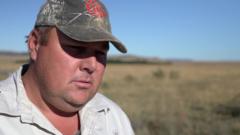The P39-1 road in South Africa gained unexpected global attention when President Trump misidentified a temporary memorial of crosses as a burial site. The community's reaction highlights their complex experiences with race relations and safety.
Misunderstood Memorial: The P39-1 Road's Unfounded Global Attention

Misunderstood Memorial: The P39-1 Road's Unfounded Global Attention
A temporary memorial that sparked an international controversy is misrepresented in a viral video from President Trump, revealing local sentiments about race and safety in South Africa.
On a quiet stretch of road in South Africa, the P39-1, a recent incident has thrust this unremarkable highway into the international spotlight. Connecting the small towns of Newcastle and Normandein, this four-hour drive from Johannesburg served as the backdrop for a video released by former U.S. President Donald Trump, which has since stirred controversy regarding race relations in South Africa.
In a video released earlier this week, Trump claimed the road was home to a burial site for more than a thousand Afrikaners killed in violent attacks. The aerial shots of white crosses lining the roadside presented a grave image of persecution against white South Africans. However, locals quickly disputed this narrative, revealing the crosses were part of a temporary memorial erected following the tragic murders of Roland Collyer's aunt and uncle back in 2020.
The floating crosses were meant to honor the lives lost in a spate of violent farm attacks, sparked by the horrifying deaths of Glen and Vida Rafferty, who were murdered in their home. Community members, including Collyer, have pointed out that these symbols of remembrance were removed long ago, and the site is no longer what it once was.
Rob Hoatson, a local businessman who helped initiate the memorial, clarified its temporary nature while emphasizing the need for awareness regarding the violent crime affecting farmers, which remains a pressing concern in the area. Following the conviction of two men for the Raffertys' murder, there had been a significant rise in racial tension, prompting officials to engage with both Afrikaners and the local black community.
Despite the misrepresentation in Trump's video, Collyer appreciates the ensuing spotlight, hoping it will raise awareness of the violence faced by farmers irrespective of race. He indicated that many in the community, both black and white, wish to collaborate for the betterment of South Africa, despite the nation’s turbulent history.
Conversing with other locals, such as 63-year-old Bethuel Mabaso, it became evident that the community is predominantly peaceful and open to dialogue. Mabaso expressed surprise at the global attention, stating that incidents of violence are rare in their locality.
Furthermore, areas of mutual respect were expressed among farmers and their workers, with Mbongiseni Shibe noting that any disputes are typically resolved through discussion rather than escalation.
While Collyer remains rooted in South Africa, embodying a resilience that reflects generations of family history, the awareness of racial dynamics, particularly the fears surrounding personal safety, lingers. He intends to continue advocating for understanding and progress amid the complexities of South African society.
This unexpected surge of international focus may serve as a stepping stone towards more profound conversations about race relations, highlighting the urgent need for unity against a backdrop of violence still affecting countless lives in South Africa today.




















